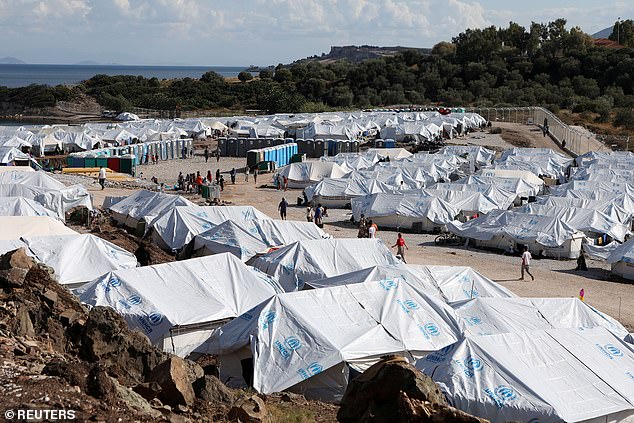Male asylum seekers who are single and healthy will be deported back to Greece after arriving in Germany, a top court has ruled.
The Federal Administrative Court in Leipzig decided that migrants will not face inhumane or degrading conditions if they were sent back.
Judges were ruling on a case of both a 34-year-old man born in northern Gaza and a 32-year-old Somali national, both of whom were granted protection status in Greece.
The court determined that while migrants in Greece receive little to no access to state support, young, able-bodied men should be able to deal with the circumstances there.
Robert Keller, one of the judges, said that the ruling was ultimately based on whether refugees in Greece had access to ‘bread, bed and soap’.
He said: ‘That’s not much, we know that.
‘It’s a tough benchmark.’
The ruling accepted that waiting times for documents and a lack of support were issues for asylum seekers in Greece.

Refugees and migrants make their way in the Kara Tepe camp on the island of Lesbos, Greece

The court ruled that while migrants in Greece receive little to no access to state support, young, able-bodied men should be able to deal with the circumstances there
But it said that migrants could ‘likely’ find shelter in temporary or emergency accomodation and have access to ‘basic sanitary facilities’.
It added: ‘It cannot be expected with any significant probability that able-bodied, healthy and single young male beneficiaries of protection returning to Greece will find themselves in extreme material hardship, preventing them from meeting their most basic needs in terms of accommodation, food, and hygiene.
‘Due to bureaucratic hurdles and waiting times to receive the necessary documents, many beneficiaries of protection do not have access to state support immediately upon arrival.
‘However, they can likely find accommodation at least in temporary shelters or emergency accommodations with basic sanitary facilities, which are operated, among other things, at the municipal level and by non-governmental aid organizations.’
Under the Dublin Agreement, asylum seekers are supposed to have their claims processed in the first EU country they enter, but such rules are rarely enforced.
The landmark ruling follows a similar case decided last Thursday in Germany, which saw an Afghan national threatened with deportation as he was ‘not at serious risk of inhuman or degrading treatment if he returned to Greece’, according to court documents.
The German asylum rights group Pro Asyl said asylum seekers can often end up homeless in Greece.
Managing Director Karl Kopp even accused the Greek government of pursuing a deliberate ‘policy of impoverishment.’

The court ruled: : ‘It cannot be expected with any significant probability that able-bodied, healthy and single young male beneficiaries of protection returning to Greece will find themselves in extreme material hardship, preventing them from meeting their most basic needs in terms of accommodation, food, and hygiene’

A woman holds a Greek flag and a placard reading ‘Close the borders, Deport the illegal migrants’ as she takes part in a demonstration against the governments plans to build new migrant camps on the islands
Around 25,000 people who had previously been recognized as refugees in Greece applied for asylum in Germany in 2024 alone, according to the organisation.
It is likely to come as a major boost for incoming Chancellor Friedrich Merz, who has vowed to slash the number of incoming asylum seeker arrivals to under 100,000 a year.
The head of the Christian Democrats (CDU), who will be sworn in next month, said this week that immigration figures ‘need to significantly’ come down below six figures amid pressure on public services and towns.
Despite a fall in asylum applications by almost a third last year, Germany is still the most popular European destination for migrants, with 235,925 initial applications made.
Merz is under intense political pressure to slash migrant arrivals further after the far-Right Alternative for Germany (AfD) party came second in February’s elections.
‘Our position is that these figures need to significantly come down,’ he told Caren Miosga, a German talk show.

Merz is under intense political pressure to slash migrant arrivals further after the far-Right Alternative for Germany (AfD) party came second in February’s elections
‘It can no longer be a six-digit figure – towns, communities, schools, hospitals and infrastructure are overwhelmed.’
Last week Merz announced that the CDU had agreed a coalition deal with the centre-Left Social Democrats (SPD).
The partnership would involve a tougher migration policy, including plans to end the path to German citizenship after three years of residency.
Under the new rules, migrants will only be eligible for naturalization after five years of successful integration.
This article was originally published by a www.dailymail.co.uk . Read the Original article here. .

